‘Shining City’ at Irish Theatre: Shattering drama for one, encumbered by three extra characters
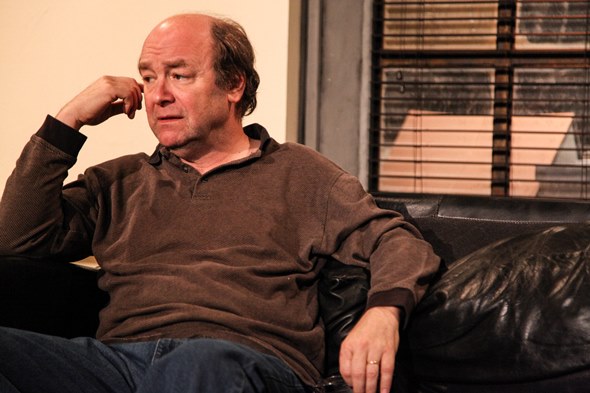 “Shining City” by Conor McPherson, presented by Irish Theatre of Chicago at The Den Theatre, through Jan. 4. ★★★
“Shining City” by Conor McPherson, presented by Irish Theatre of Chicago at The Den Theatre, through Jan. 4. ★★★
By Lawrence B. Johnson
For every line Brad Armacost speaks as a grief- and guilt-ridden widower consulting a therapist in Conor McPherson’s “Shining City,” but especially for the prodigious and emotionally wrenching monologue that occupies the center of this 90-minute drama, the production by Irish Theatre of Chicago is greatly to be recommended. For the rest, neither McPherson’s patch-up of a play nor this realization directed by Jeff Christian holds much charm.
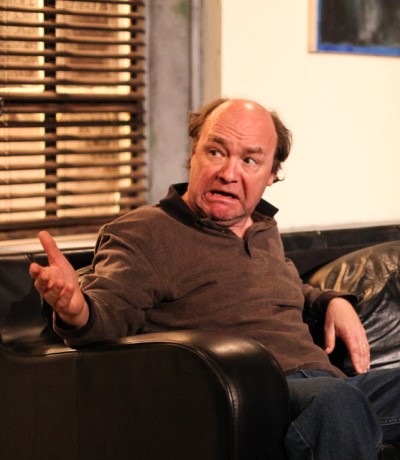 Conor McPherson, 43, has emerged as the new exemplar of Irish theater craft. His finely etched play “The Seafarer” was a Chicago highlight last season in this company’s superb production also starring Armacost. Earlier this season, McPherson’s unerring ear for language and his empathy for characters hanging onto life by their fingernails took lyric flight in Steppenwolf’s splendid staging of “The Night Alive.”
Conor McPherson, 43, has emerged as the new exemplar of Irish theater craft. His finely etched play “The Seafarer” was a Chicago highlight last season in this company’s superb production also starring Armacost. Earlier this season, McPherson’s unerring ear for language and his empathy for characters hanging onto life by their fingernails took lyric flight in Steppenwolf’s splendid staging of “The Night Alive.”
And what is best about “Shining City,” namely every syllable McPherson has written for the troubled soul played by Brad Armacost, bears the playwright’s Shakespearean sense of human imperfection and a gentle compassion that goes with it. But I also get the impression that “Shining City” was committed to the page as little more than facile embroidery of a really good core idea: the implosion of a man’s life in the wake of his wife’s death in an automobile accident — after he has verbally battered her in an outburst of pent-up frustration, disappointment and rage.
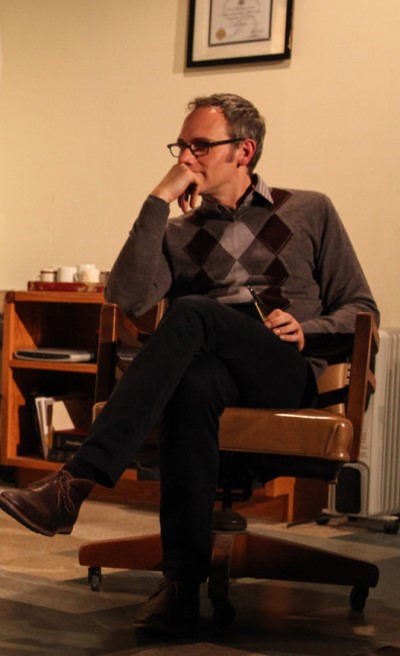 Even within that narrow frame, in scenes of the miserable fellow’s psychological consultations, McPherson’s play is unbalanced. The therapist (Coburn Goss) is quite new to his profession. In fact, he is an ex-priest who lost his way in that trade and found a course of study to practice as a therapist. He doesn’t show much aptitude for it – a curiosity that I’m inclined to ascribe more to McPherson’s lack of interest than to any clever plot-stirring.
Even within that narrow frame, in scenes of the miserable fellow’s psychological consultations, McPherson’s play is unbalanced. The therapist (Coburn Goss) is quite new to his profession. In fact, he is an ex-priest who lost his way in that trade and found a course of study to practice as a therapist. He doesn’t show much aptitude for it – a curiosity that I’m inclined to ascribe more to McPherson’s lack of interest than to any clever plot-stirring.
As a former priest, the therapist might at least be expected to display more composure and aplomb than this chap evinces in his clumsy dealings with his aggrieved patient. His speech is persistently hesitant, shallow, groping and vague. Never mind that he’s dealing with the remarkable discovery that his client, John, has been propelled into counselling because he has seen a ghost – of his late wife, and more than once.
The therapist, Ian, has issues of his own. He’s staring at unexpected and unwelcome fatherhood with his girlfriend (Carolyn Kruse) and wants no part of that. Actually he wants no part of the woman; or more accurately, he wants no further physical relationship with her. Their heated breakup – in the minimal office set doubly credited to Ira Amyx and John Peplinski — provides a moderately interesting interlude between therapy sessions with John, though the playwright doesn’t really pursue the couple’s fraught situation. Mainly, it’s a big setup for what we’re soon to discover about Ian. I’ll leave it at that, except to say the revelation happens later, in a brief scene that feels dreadfully underwritten between Goss’ ever-anxious ex-priest and a walk-on character played by Shane Kenyon.
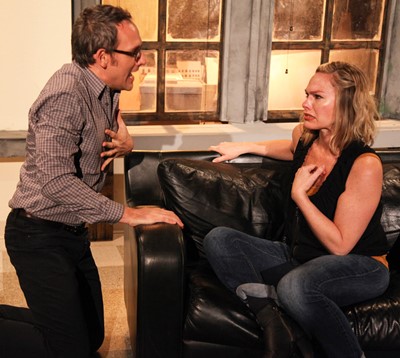 This play well might have fared better as a monodrama. Armacost is brilliant, moving John’s painful history inexorably forward, needing so desperately to get it off his chest, to own up to the thing for which he feels such deep shame, such suffocating remorse.
This play well might have fared better as a monodrama. Armacost is brilliant, moving John’s painful history inexorably forward, needing so desperately to get it off his chest, to own up to the thing for which he feels such deep shame, such suffocating remorse.
In the first, getting-to-know-you session, John works past the small talk to get at the astonishing circumstance that has brought him here: He has seen the ghost of his wife, as certain as he is now talking to the therapist. What’s more, he has moved out of his house to a B&B, at which safe distance he can ponder the meaning of this specter. Ah, the meaning. The therapist doesn’t really scratch for that. But he does offer some practical advice: that John should get back on the horse, as it were; man up, march back into his home and reclaim his life.
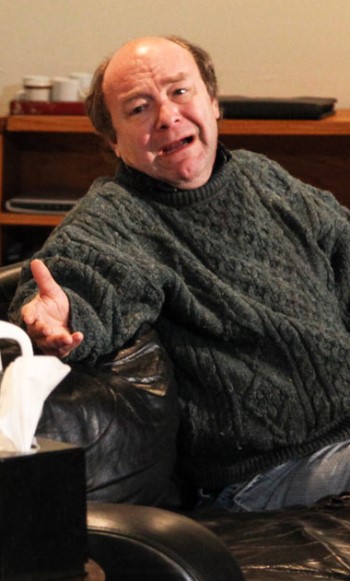 It is in a later session that Armacost’s vulnerable, anguished John begins to peel away the layers of his suffering. Without much prodding from his interlocutor, he launches ever so gradually into a monologue as tormented as it is sweeping — on the life he has lived, the disappointment he has endured, the brazen gesture he made as if to acknowledge himself and the horrific unforeseen consequences of his action. I don’t know when I have seen an actor convey agony with such crimson conviction, such visage-distorting honesty. I was barely able to watch, yet couldn’t shift my gaze. Here was truth, raw and awful.
It is in a later session that Armacost’s vulnerable, anguished John begins to peel away the layers of his suffering. Without much prodding from his interlocutor, he launches ever so gradually into a monologue as tormented as it is sweeping — on the life he has lived, the disappointment he has endured, the brazen gesture he made as if to acknowledge himself and the horrific unforeseen consequences of his action. I don’t know when I have seen an actor convey agony with such crimson conviction, such visage-distorting honesty. I was barely able to watch, yet couldn’t shift my gaze. Here was truth, raw and awful.
In the final scene at the therapist’s office, a rambling stretch of chitchat that must be going somewhere, a now clear-eyed and reinvigorated John thanks the therapist for his help. The shrink sheepishly demurs. “You did all the work,” he says. Truer words were never spoken.
And so the patient takes his leave. But wait…Ah, forget it. Just for a second, I thought I glimpsed something. Surely not. Surely not that.
Related Links:
- Performance location, dates and times: Details at TheatreinChicago.com
- Shining hour for troupe rechristened as Irish Theatre of Chicago: Read it at ChicagoOntheAisle.com
- ‘Seafarer’ taps into human comedy with earthy charm and touch of grace: Read the review at ChicagoOntheAisle.com
- Brad Armacost switched brothers to play blind, boozy character in ‘The Seafarer’: Read the interview at ChicagoOntheAisle.com
- McPherson’s ‘The Night Alive’ at Steppenwolf: Looking for answers in life’s rubble: Read the review at ChicagoOntheAisle.com
Tags: Brad Armacost, Carolyn Kruse, Coburn Goss, Conor McPherson, Ira Amyx, Irish Theatre of Chicago, Jeff Christian, John Peplinski, Shane Kenyon, Shining City

